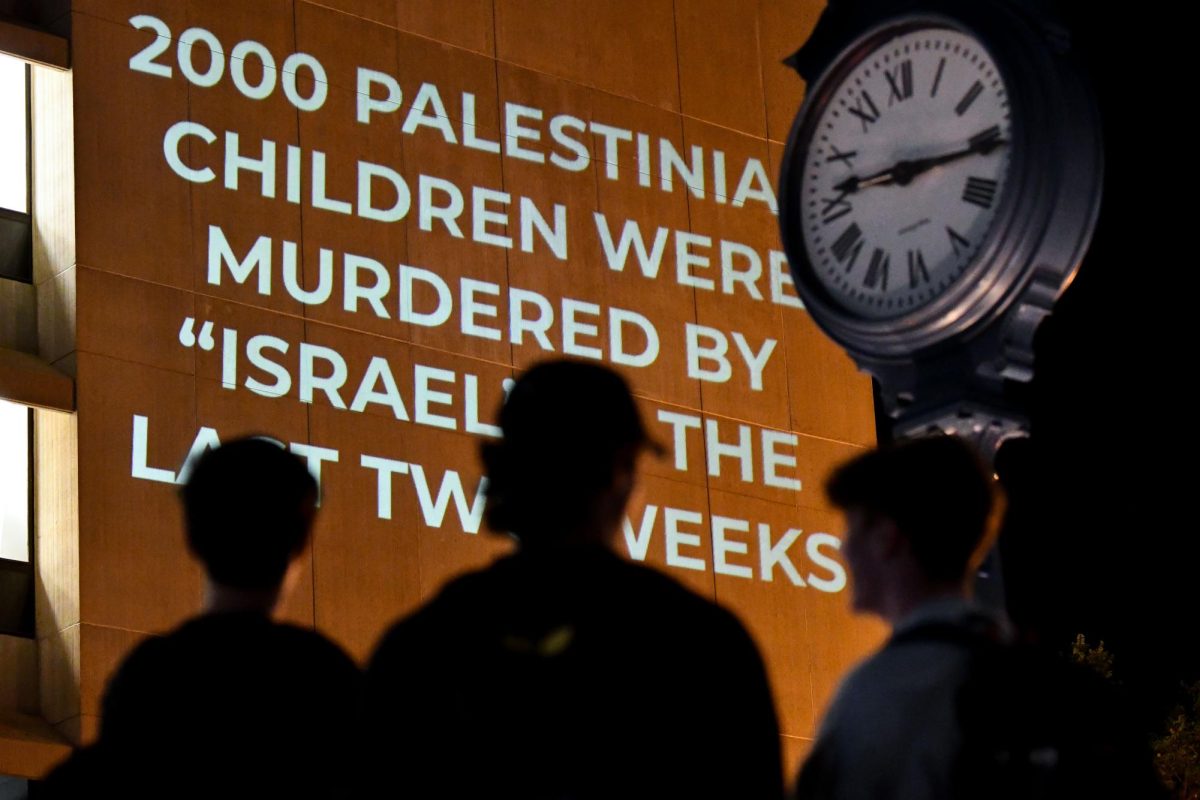Updated: Oct. 31, 2023, at 8:06 p.m.
Five Students for Justice in Palestine chapters from universities in D.C., Maryland and Virginia released a statement proclaiming solidarity with GW’s SJP chapter after the group’s Tuesday projections onto Gelman Library and the subsequent condemnation from GW.
SJP chapters at American, George Mason and Howard universities and the universities of Maryland and Virginia said University President Ellen Granberg’s response to the student demonstration aimed to “incite fear” on campus and silence the voices of GW students. The chapters said the student demonstrators — who projected anti-Israel and anti-GW messages onto the outside wall of the library — were exercising their freedoms of speech and assembly.
Four students from GW SJP projected about 10 messages onto the library, including “End the siege on Gaza,” “Free Palestine from the river to the sea,” “Glory to our martyrs,” “Your tuition is funding genocide in Gaza” and “President Granberg is complicit in genocide in Gaza.” After about two hours of projecting, officials and two GW Police Department officers shut down the demonstration, which many politicians, alumni and student organizations have decried as antisemitic.
“On a campus where diverse perspectives are supposed to be ‘valued,’ the GWU administration is actively silencing Palestinian voices,” the joint SJP statement reads. “The strong arm tactics employed by the administration of George Washington University against nonviolent student protestors due to their opposition of the ongoing genocide in Gaza by the zionist entity are frankly appalling.”
Granberg called the messages antisemitic and a violation of GW policy, saying they do not contribute to the environment of debate and discussion expected at GW in a statement Wednesday night. In an earlier, unsigned statement Wednesday, officials said they would take the “appropriate steps” against the student demonstrators.
University spokesperson Josh Grossman did not immediately return a request for comment.
The letter states Granberg and University leadership are jeopardizing the safety of Palestinian students and allies. The chapters also criticized Granberg and other officials for standing “idly by” as government leaders target the demonstrators, who they said have faced numerous threats of suppression, expulsion and deportation in the days following the projections.
The statement said students and campus security had subjected GW SJP members to political, ethnic and racially charged harassment and slander and condemned GW administrators for failing to support students being harassed. It states that administrators have sided with the “harassers” and endorsed the “aggressive policing” of GW SJP’s nonviolent demonstrations on campus.
The statement also condemns the United States government’s role in supporting Jewish Americans’ right to safety and security in the country while failing to recognize that Palestinian students have been at the “greatest risk” of doxxing, racial harassment and verbal abuse in school settings. On Thursday, the senate passed a resolution sponsored by Sen. Josh Hawley (R-MO) that denounces the rhetoric of anti-Israel student groups as antisemitic — including GW SJP’s projections on the library — and sympathizing with “genocidal violence against the State of Israel.”
The SJP chapters said claims that anti-Israel protests are antisemitic are “fictitious” and distract attention away from the “ongoing ethnic cleansing” of Palestinians. The statement said fruitful discourse about the war is not possible given Israel’s ongoing violence toward Palestinians.
“There is no space for rigorous debate and discussion when the zionist occupation is partaking in ethnic cleansing and genocide,” the statement reads. “There is no productive disagreement when it comes to the indiscriminate bombing of hospitals, destruction of homes, displacement of 1.3 million people, and the murder of more than 7,000 Palestinians.”
Other GW student organizations’ responses to GW SJP’s demonstration have varied.
The national chapters of Alpha Epsilon Phi, Sigma Delta Tau, Zeta Beta Tau and Alpha Epsilon Pi — Jewish fraternities and sororities on campus — wrote a letter to Granberg on Thursday expressing “deep concern” over the University’s response to the projections on the library. The letter, signed by national representatives and posted to Instagram, states that Granberg’s response is “unactionable” and does not express a “plan of accountability” for the students who were involved.
“It is unacceptable to allow those who support terrorism to threaten Jewish students on campus and we call for your administration to increase the security presence surrounding Jewish organizations and students,” the letter reads.
Jewish Voice for Peace at GWU — a Jewish anti-Zionist student organization — posted a statement to their Instagram Thursday saying Granberg’s statements “directly harm” anti-Zionist students and display her “routine bias” in favor of Zionist Jewish students. JVP said they support the messages SJP displayed on the wall of Gelman Library.
“While Zionist Jewish students are benefited with every resource and a right to safety, this university not only neglects but actively jeopardizes the security and dignity of its anti-Zionist students,” JVP’s statement reads.
GW Black Defiance — a student organization dedicated to promoting Black feminism and combating white supremacy — said it stands in solidarity with pro-Palestinian organizers and Muslim students at GW in a statement via Instagram Friday. The organization said the Black liberation struggle is “inherently connected” to Palestine’s struggle for self-determination.
“As an organization, we will continue to stand by our Palestinian brothers and sisters who are fighting for liberation in their homeland and encourage people to educate themselves on the history of apartheid and ethnic cleansing in Palestine,” the statement reads.
This post was updated to clarify the following:
The Hatchet updated this post to clarify that the joint SJP statement condemns the U.S. government’s failure to recognize the risk of doxxing, racial harassment and verbal abuse that Palestinian students face in school settings despite supporting Jewish Americans’ right to safety and security.





